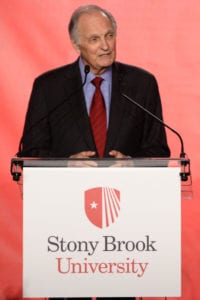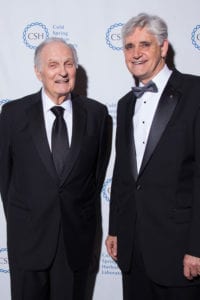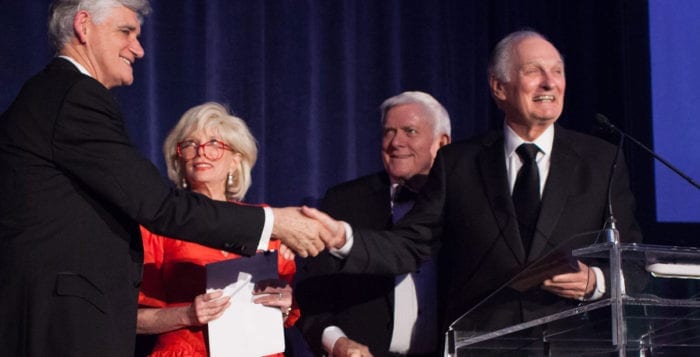By Daniel Dunaief
In a world of tirades and terrifying tweets, the Alan Alda Center for Communicating Science at Stony Brook University is encouraging its professors and students to do something the center’s namesake urges: Listen.
Tough as it is to hear what people mean behind an explosive expression that fuses reason and emotion, the scientists in training, established researchers and others who attend some of the lectures or workshops at the center go through an exercise called “rant” in which each person listens for two minutes to something that drives their partner crazy. Afterward, the scientist has to introduce their partner to the group in a positive way.

The staff at the Alan Alda Center finds inspiration, a role model and a humble but willing listener in Alda, the highly decorated actor of “MASH” who has spent the last several decades drawing scientists out of dense shells constructed of impenetrable jargon and technical phrases.
For his dedication to forging connections for scientists, Times Beacon Record News Media is pleased to name Alan Alda a 2016 Person of the Year.
“He’s doing a wonderful job,” said Jim Simons, the former chairman of the Stony Brook Mathematics Department and hedge fund founder who shared the stage with Alda this summer as a part of a Mind Brain Lecture at Stony Brook. “I can’t think of anyone better to be an honoree.”
Simons described a moment with Alda, who is not a scientist nor does he play one on TV, when he was sharing some abstruse mathematics. Alda’s eyes “glazed over when I was first talking to him. He’s teaching scientists not to get a glaze over their audience’s eyes.”
Alda works tirelessly to share a method that blends scientific communication with the kind of improvisational acting he studied early in his career.
“Improv is not about being funny,” said Laura Lindenfeld, the director at the center. “It’s about being connected.”
Last June, Alda was a part of a team that traveled to California to share an approach that is in demand at universities and research institutions around the world. The day of the workshop, three people who were supposed to help lead the session were delayed.
Alda suggested that he run the event, which would normally involve several instructors and break-out groups. Learning about the art of connecting with an audience from someone who reached people over decades through TV, movies and Broadway performances, the attendees were enchanted by their discussion.
“He’s the master,” said Lindenfeld, who was at the campus when the team received news about the delay for the other instructors.
As soon as the session ended, Alda headed for Los Angeles to conduct a radio interview.
“I handed him a granola bar,” recalled Lindenfeld, who joined the center last year. “I was afraid he hadn’t eaten.”
Alda celebrated his 80th birthday earlier this year and shows no signs of slowing down, encouraging the spread of training techniques that will help scientists share their information and discoveries.
“He’s teaching scientists not to get a glaze over their audience’s eyes.”
— Jim Simons
The Alda Center is planning a trip to Scotland next year and has been invited to go to Norway, Germany and countries in South America, Lindenfeld said.
When the University of Dundee received a grant from the Leverhulme Trust to create the Leverhulme Research Centre for Forensic Science, officials in Scotland, one of whom knew Lindenfeld personally, researched the Alan Alda Center’s mission and decided to forge a connection. Lindenfeld helped coordinate a congratulatory video Alda sent that the Scottish centre played at its opening ceremony.
“Everyone present from the highest Law Lord in Scotland, through to the principal of the university and the Leverhulme trustees did not know it was going to happen, and so it was a huge surprise that stunned the room into complete silence,” recalled Sue Black, the director of the centre in an email. “Brilliant theatre of which Mr. Alda would have been proud.”
Established and internationally known scientists have expressed their appreciation and admiration for Alda’s dedication to their field.
The training sessions “drag out of people their inhibitions and get them to think about interacting with the public in ways that they might not have felt comfortable doing before,” said Bruce Stillman, the president and CEO of Cold Spring Harbor Laboratory. This month, Cold Spring Harbor Laboratory gave Alda the Double Helix Medal at a ceremony at the American Museum of Natural History in New York City.
Stillman described the public understanding and perception of science as “poor.” To bridge that gap, Alda’s programs “induce scientists to feel comfortable about talking to the public about their ideas and progress.”
Nobel Prize winner Eric Kandel suggested that Alda’s accomplishments exceed his own.
“There ain’t many Alan Aldas, but there are a lot of Nobel Prizes out there,” Kandel said. While Kandel is “extremely indebted to having won the Nobel Prize,” he said the totality of Alda’s accomplishments are “enormous.”
The Alda Center is working with Columbia University, where Kandel is the director of the Kavli Institute for Brain Science and a professor, to develop an ongoing program to foster scientific communication.

Kandel, who considers Alda a friend, appreciates his support. Kandel said Jeff Lieberman, the chairman of the Department of Psychiatry at Columbia, asked Alda and Kandel to give a talk on issues related to neuroscience. Lieberman “was my boss,” Kandel said, “I had to be there, but [Alda] didn’t have to be there. He goes out of his way for people.”
In 2017, the center will not only share its communication techniques around the world, but it will also create conferences for timely scientific topics, including climate change and women in science.
The glass ceiling is a “real issue for women in science,” said Valerie Lantz Gefroh, the improvisation program leader at the center. “We’re hoping to give [women] better communication tools so they can move forward in their careers.”
The center is also adding new courses. Next fall, Christine O’Connell, who is a part of a new effort at Stony Brook called the Science Training & Research to Inform Decision and is the associate director at the center, will teach a course on communicating with policy and decision makers.
That will include encouraging scientists to invite state senators to see their field work, going to Congress, meeting with a senator or writing position papers. In political discussions, scientists often feel like “fish out of water,” O’Connell said. The course will give scientists the “tools to effectively engage” in political discussions.
Scientists don’t have to be “advocates for or against an issue,” O’Connell said, but they do have to “be advocates for science and what the science is telling us.”
Given an opportunity to express her appreciation directly to Alda, Black at the University of Dundee wrote, “Thanks for having the faith to collaborate with our centre so far away in Scotland, where we are trying to influence the global understanding of forensic science in our courtrooms — where science communication can make the difference between a guilty or an innocent verdict and in some places, the difference between life and a death sentence.”
To borrow from words Alda has shared, and that the staff at the center believe, “Real listening is a willingness to let the other person change you.” Even if, as those who have gone through some of the sessions, the speaker is ranting.





